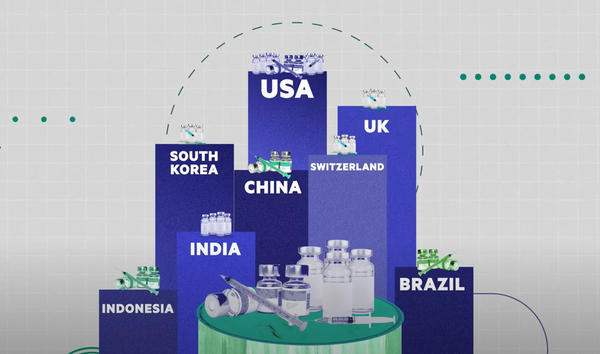Cytiva, a U.S. company supplying raw and subsidiary materials for vaccine production, decided to invest $52.5 million in Korea until 2024 to build manufacturing facilities for global capacity expansion.

Vaccine developers and research institutes from Korea and the U.S. also agreed to cooperate in developing vaccines and supplying raw and subsidiary materials.
The Ministry of Health and Welfare (MOHW) said Tuesday that Cytiva had submitted an investment report to the Korean government at the Korea-U.S. vaccine partnership meeting held in New York with the attendance of President Moon Jae-in. The U.S. company will invest $52.5 million for three years from 2022 to 2024 to build facilities for manufacturing single-use bioreactors used in vaccine production.
"This is the first case of a global company specializing in raw and subsidiary materials investing in Korea’s production facilities amid the Covid-19 pandemic," the ministry said. "We expect the investment to contribute to establishing a stable supply chain for vaccine raw materials and help Korea become a global vaccine hub."
Cytiva's technology is used in about 75 percent of all biopharmaceutical products approved by the U.S. Food and Drug Administration.
The company and the Financial Times' research arm Longitude researched global biopharmaceutical companies in more than 40 countries. They ranked 20 countries based on evaluating five key indicators, including supply chain resilience, talent pool, and government policy and regulation after the Covid-19 outbreak, and Korea placed in the top 10.
On Sept. 14, Cytiva reviewed Korea as a potential production base in Asia based on the resilience and sustainability of the domestic supply chain.
"Cytiva made the investment decision recognizing the high growth potential of Korea's bio-industry and the government's will to foster the vaccine and bio-industry," Second Vice Minister of Health and Welfare Kang Do-tae said. "This will contribute to stabilizing the supply of essential raw and subsidiary materials to domestic companies and resolve the global supply shortage of raw and subsidiary materials."
The U.S. company had also signed an agreement with Prestige Biopharma, a domestic bio company, to make single-use bioreactors before the latest decision.
With the partnership, Cytiva agreed to supply bioprocessing equipment for cell culture and purification used for vaccine and biologics production and technologies and solutions for Prestige Biopharma to produce multiple vaccines and biologics rapidly.
"We have reached a point where we need rapid and close collaboration between global vaccine companies as the vaccine shortage has continued due to the prolonged Covid-19 pandemic," Prestige Biopharma CEO Park So-yeon said. "We will try to contribute to resolving the global vaccine supply shortage by using our vaccine production facilities most efficiently."
Cytiva plans to export raw and subsidiary materials manufactured in Korea to other Asian countries.

